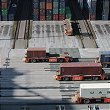Understanding Cargo Logistics
Cargo logistics is the intricate process of planning, implementing, and controlling the efficient, effective forward and reverse flow of goods, services, and related information between the point of origin and the point of consumption. It encompasses a complex network of activities that ensure goods are transported safely, efficiently, and cost-effectively.
Key Components of Cargo Logistics
1. Transportation Planning
Transportation is the heart of cargo logistics, involving multiple modes of transport:
- Air Freight: Fastest mode of transportation, ideal for time-sensitive and high-value goods
- Sea Freight: Most cost-effective for large volumes of goods, especially international shipments
- Road Transportation: Flexible and crucial for last-mile delivery
- Rail Freight: Efficient for long-distance transportation of bulk goods
2. Warehousing and Storage
Critical aspects of cargo logistics include:
- Inventory Management: Tracking and managing stock levels
- Storage Solutions: Specialized facilities for different types of goods
- Inventory Tracking: Using advanced technologies like RFID and GPS
- Handling Equipment: Specialized machinery for loading, unloading, and moving goods
3. Packaging and Protection
Ensuring goods remain intact during transportation:
- Protective Packaging: Materials and techniques to prevent damage
- Specialized Containment: Solutions for fragile, hazardous, or temperature-sensitive items
- Standardized Packaging: International shipping containers and standardized packaging methods
4. Documentation and Compliance
Navigating complex regulatory requirements:
- Shipping Documents: Bills of lading, customs declarations, and export/import permits
- Customs Clearance: Managing international trade regulations
- Compliance Tracking: Ensuring adherence to international shipping standards
Technology in Cargo Logistics
Digital Transformation
- Real-Time Tracking: GPS and IoT technologies
- Artificial Intelligence: Predictive analytics for route optimization
- Blockchain: Improving transparency and traceability
- Automated Systems: Enhancing efficiency in warehousing and transportation
Challenges in Cargo Logistics
Major Obstacles
- Global Supply Chain Disruptions
- Rising Transportation Costs
- Environmental Regulations
- Technological Integration
- Security Concerns
Sustainability in Cargo Logistics
Green Initiatives
- Reducing Carbon Footprint
- Eco-Friendly Transportation Methods
- Sustainable Packaging Solutions
- Energy-Efficient Warehousing
Economic Impact
Cargo logistics plays a crucial role in global economics:
- Facilitates International Trade
- Supports Global Supply Chains
- Creates Economic Opportunities
- Drives Technological Innovation
Conclusion
Cargo logistics is a dynamic and essential field that connects businesses, consumers, and markets globally. As technology advances and global trade becomes more complex, the role of efficient cargo logistics becomes increasingly critical.
Key Takeaways
- Cargo logistics is more than just moving goods
- Technology is transforming the industry
- Efficiency and sustainability are key priorities
- Strategic planning is essential for success
Future Outlook
The future of cargo logistics promises:
- Greater technological integration
- More sustainable practices
- Increased global connectivity
- Advanced predictive and adaptive systems
Remember: Effective cargo logistics is the invisible force that keeps global trade moving, connecting businesses and consumers across the world.






